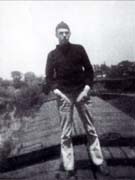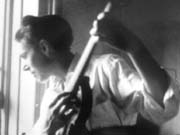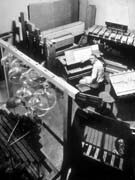 |
||
|
|
 |
|
| Harry Partch's World |
|
It's the last gasp of the Old West at the turn of the 20th century. Three children play among the rocks near the Arizona, Mexico, and California border. The youngest, Harry, likes to order musical instruments from the "Monkey-Ward" catalog and read of the adventures of Ancient Greece. Mom sings him Chinese lullabies and Christian hymns (his parents had just come back from ten years of missionary duty in China). The nearest town, Benson, has 300 people and 40 taverns, the better to entertain the railway workers. Harry makes pocket money delivering toothpaste and curlers to the sex workers. Yaqui Indian songs can be heard from afar at night, mixed in with melancholy steam-engine whistles from miles away. Harry is called a sissy but doesn't get beaten up at school because he plays piano for the silent movies and the people value his fingers. At home he invents melodramatic stories about deadly dust storms while beating the inside of the piano strings. What better start to a maverick career? What better ingredients for creating a composer, dishwasher, proofreader, hobo, fruit picker, sailor, microtonal theorist, instrument builder, writer, visual artist, satirist, philosopher, flunky, musicologist, copy editor, man of letters, publisher, iconoclast, record producer, eccentric, teacher...? |
||||||||||
|
Welcome to Harry Partch's World. His teenage years barely over, he finds himself in Los Angeles, proofreading for the LA Times and encountering conventions of music far different from what he knew. He lies on the beach in Hawaii trying to write fugues; he practices Chopin until he gets sick; and he goes to the first Hollywood Bowl symphony concerts. None of it makes sense. With his sing-song voice he declaims the poetry of the Bible, Shakespeare, and Li Po, finding that the slight melodic inflections of his voice cannot be found among the tones of the piano. He's always in the cracks. And people throughout history from Greek dramatists to the Florentines to W.B. Yeats all say that music should support the words. What gives? Surely that operatic wobble can't be the answer! The public library became his best friend. One day he finds a big German book full of numbers and diagrams. Herman Helmholtz had written all about the history of tuning systems, harmony, and consonance/dissonance. The 12 equal steps of the piano were but a momentary aberration in the scale of things: intervals are better described by numbers (string lengths or frequency ratios) rather than letter names; the Greeks, Arabs, Chinese, Indians, and Europeans had all proposed different kinds of tunings and temperaments, and music had evolved along with them. Then one day it stopped. No one had mentioned Pythagoras or Rameau during music classes; indeed no one had mentioned there was ever a problem. The keyboard was simply a God-given fact. Now Harry had a mission: set the world right for the speech-music connection, even if it meant making instruments differently. Even if it meant going back to the time when music history went off the rails. Even if it meant taking a closer look at music from non-European backgrounds. Even if it meant seeing what else the Euro-centric, religion-obsessed establishment was hiding from him: the wondrous human body, his sexuality, the artificial separation of music, dance, and drama. Taking the neck of a cello and attaching it to a viola, he began a 40-year journey into carpentry, instrument building, and tuning. He celebrated by filling his pot-bellied stove with his old manuscripts and enjoying the heat they gave off. |
|||||||||||||
|
By 1969, the year he recorded "Delusion of the Fury," Partch had designed 27 new instruments, all to be played on stage in a spatial ritual theater. These instruments were made to be beautiful in sound, vision, and magical purpose. They were tuned according to the natural overtone series (Just Intonation) which sounds different from the piano tuning our ears have grown accustomed to. Some, like the Chromelodeon, had as many as 43 tones in a single "octave." But more than this, he designed the instruments to be "corporeal." To Partch, corporeal meant to involve the whole body—the whole person—in the art. He hated the way performing-art forms had been separated by "the curse of specialization:" a musician is only a musician, a dancer only a dancer. He wanted his performers to do it all, even play basketball during a performance (The Bewitched), or to strip half-naked, "and I don't care which half." He once said that he wanted the player of his Marimba Eroica to look like the chariot races in Ben Hur with the kind of active athleticism that orchestra musicians don't have. Partch made particular instruments for specific needs in his compositions. Although you can listen to the recorded sounds of his music, or even play his instruments with a mouse or a keyboard at your desk, nothing can capture the complete experience of all these elements working together in a live performance with lighting, masks, and movement presenting curious stories: a hobo's journey to Chicago; Ulysses being arrested for vagrancy; the intelligentsia gaining enlightenment at a cocktail party. Partch would suggest that you at least take your socks off, whistle mysteriously, attach your mask firmly, throw a bindle over your shoulder, cast your eyes to the gods, and thumb for a ride as you "rape and caress these instruments." Your life and humanity depend on it.
|
|||||||||||
 |
|||||
| American Mavericks | Archive | About | Contact | Stations | Features | Press | Listening Room | Discussion | Purchase | |||||







